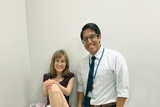Neurogenic Bladder Program

We know how overwhelming it is to learn that your child has neurogenic bladder. We are here to help. The Neurogenic Bladder Program at Children's Hospital of Philadelphia (CHOP) is a leader in the care of children with this complex condition, providing care for more than 1,000 patients.
Each member of our team is specially trained in all aspects of caring for children with this condition, from diagnosis through adulthood. Our team is made up of specialists from CHOP's Division of Urology who work closely with experts in the hospital's Spina Bifida Program as well as many other subspecialists to ensure all your child's healthcare needs are met.
How we serve you
Your child's team in the Neurogenic Bladder Program is made up of specialists who are experts in caring for children with these complex conditions.
Conditions we treat
We treat children who have any condition that causes neurogenic bladder, including spina bifida, tethered spinal cord, caudal regression, transverse myelitis, spinal cord injury, sacrococcygeal teratoma and Hinman syndrome.

Meet your team
Every person on your child's team has the same goal: to give your child the best possible care. We support your family with medical care, emotional counseling and anything else you may need.

Neurogenic Bladder Program locations
Access leaders in the care of children with neurogenic bladder.

Neurogenic Bladder Program resources
We have created resources to help you find answers to your questions and feel confident with the care you are providing your child.
Your donation changes lives
A gift of any size helps us make lifesaving breakthroughs for children everywhere.
